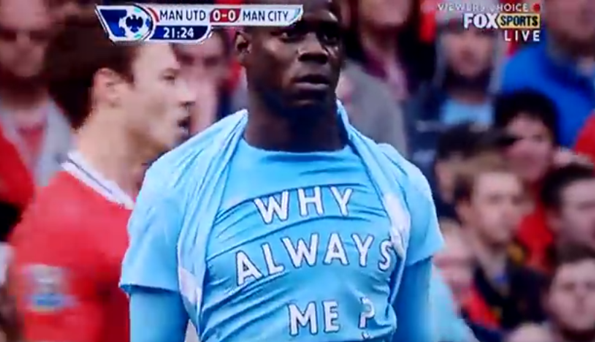
(Image: AustralianMessi/YouTube)
To footballers who have been thinking of doing your own version of “Why always me?” — now’s your time. Because in a few months, lifting up your kits to display a message on your undershirt will be banned. “From now on there can be no slogan or image whatsoever on undergarments even good-natured ones,” FIFA secretary general Jerome Valcke said after a meeting of the International FA Board.
IFAB — football’s law-making body — is made up of the four British football associations, who each have one vote, and FIFA, who has four. Any decision must be backed by 6 votes, so no rule-change can be made without FIFA’s approval. “The idea is to get some consistency. The simplest rule for the image of the game is to start from the basis that slogans will not be allowed,” said FA general secretary Alex Horne. Violators will face disciplinary action.
Now, I can only imagine your heartbreak over the trampled rights of millionaire footballers, but hear me out. Let’s put aside, for one moment, the notion that this rule-change was even needed. In the grand scheme of things, shirt messages are a fairly rare occurrence — truly controversial ones, even less so. It is not a problem (if we can even call it that) which is difficult to deal with on a case-by-case basis. A new blanket ban is, in my humble opinion, unnecessary.
Let’s even ignore that this represents another step towards stripping people in the public eye of personality or individuality, lest they should disappoint and alienate fans and sponsors by actually expressing an opinion. Footballers haven’t tended to use undershirt messages to wade into complex, geopolitical issues. Mainly they use the platform available to them to pay homage to friends, family and heroes or display inoffensive religious beliefs — like so many of the rest of us do (celebrities, they’re just like us!). And again, on the off-chance someone displays something truly unacceptable, deal with that on a case-by-case basis.
No, the issue at the heart of this, I believe, is the tireless pursuit of the FIFA’s and the IOC’s of this world to avoid anything resembling controversy. The tiniest chance of something unplanned happening to annoy Coca Cola and McDonald’s? Better put a stop to it now, just to be on the safe side! Then there is the argument of keeping sports and politics separate, which I can understand, to an extent. A blanket ban might seem like a nice and simple option. Jonathan Ford, chief executive of the Football Association of Wales, said as much, commenting after the IFAB decision that “it was easier for us to say it has no place in the game.”
As much as some might want to see the two kept apart, it simply isn’t going to happen. Sport is frequently used as a battleground of sorts in political conflicts — to suggest anything else is absurd. Sometimes athletes do take on a more overt role, but more often the mere participation (or non-participation) in a competition, or the result on the pitch, can carry a political message in itself.
The new rule will come into place in June, conveniently just in time for a World Cup that has turned into hugely politicised event. You’d forgive me for seeing this in the context of the Brazilian government’s many recent measures to suppress the large-scale anti-World Cup protests that hit their peak during last summer’s Confederation Cup, and have been ongoing ever since. These range from banning masks during protests, to banning “promoting ‘tumult’ within 5 km of a sporting event.” FIFA’s director of security recently spoke out in support of the Brazilian authorities.
Neymar, a star of the Brazilian national team, on the other hand, has expressed his support for the protests. What if, after scoring the hypothetical winning goal of a hypothetical World Cup final, he should lift his shirt to reveal another uncontroversial, yet powerful message of support? What then? Could it maybe have a galvanising effect on the people, turning the celebrations into the most powerful protest yet? Would this make it impossible for the world to ignore the legitimate grievances of the Brazilian people, and FIFA’s role in them?
No, we can’t have that. Let’s just ban the controversy before it happens. It’s easier that way.
This article was posted on March 4, 2014 at indexoncensorship.org




